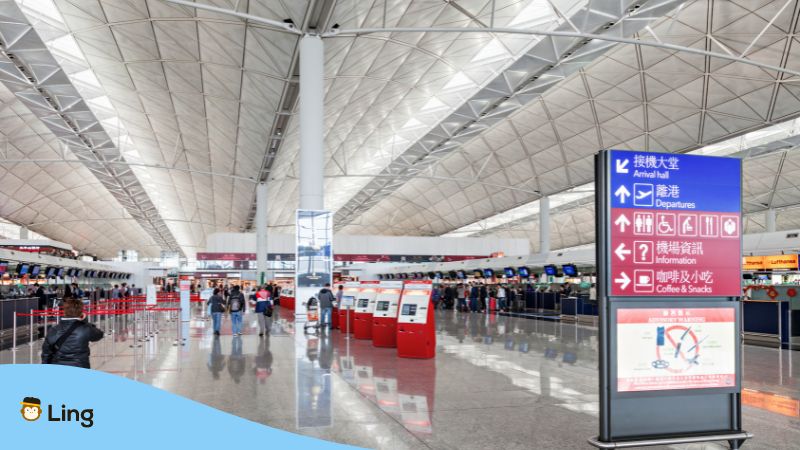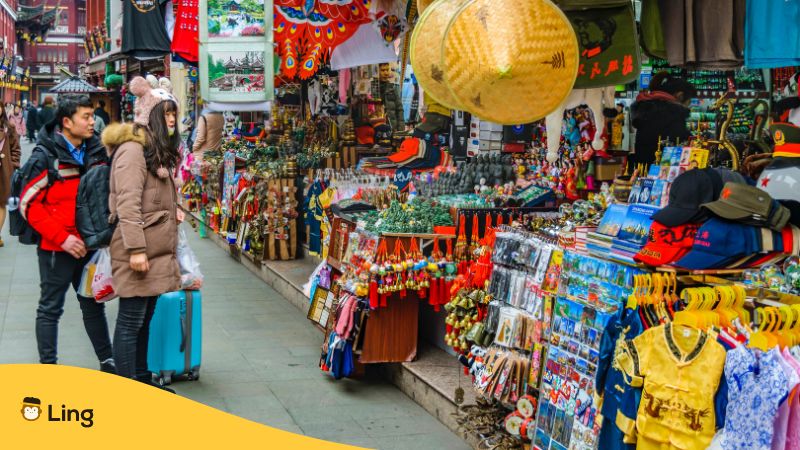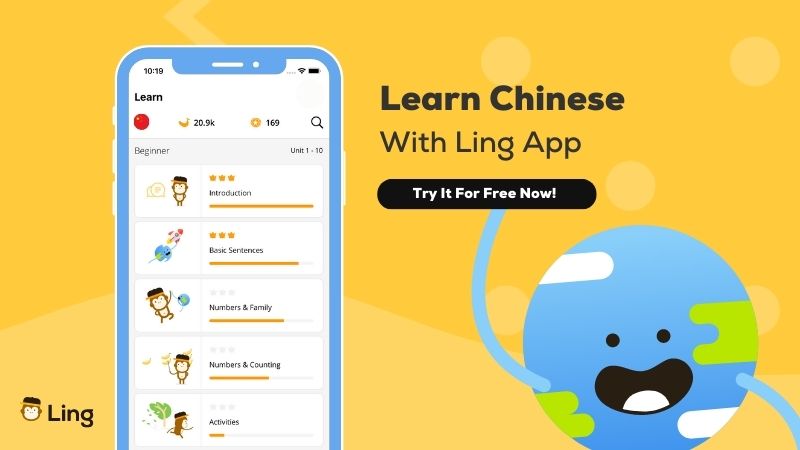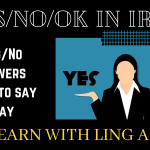If you’re planning a trip to China, it’s important to know how to get around! The country is full of wonderful sights and experiences, but it can also be a bit confusing if you don’t speak Chinese.
No need to worry, though. We’ve got you covered with these ten must-know Chinese travel phrases.
Ready? Let’s go!
Chinese Travel Phrases
Hello – 你好 (Nǐ Hǎo)
This is the most important Chinese word to know! You’ll use it everywhere, whether greeting someone or just wanting to start a conversation.
Moreover, showing that you’re trying to speak Chinese will go a long way. Doing so will earn you a lot of respect and even Chinese friends among the locals.
Some folks will even compliment you on how amazing you speak.
Thank You – 谢谢 (Xièxie)
If someone does something for you or is just being nice, 谢谢 (Xièxie) is the phrase to use. It’s a simple way to show appreciation and kindness if they don’t understand English!
Moreover, saying this Mandarin Chinese travel phrase will also be great when someone does something nice for you out of the blue. For example, if someone lets you go ahead of them in line or offers their seat on a crowded train.

I’m Sorry – 对不起 (Duì Bu Qǐ)
The Chinese are polite people and used to being treated with respect; hence, they expect you to respect their culture and customs while in the country.
Moreover, the Chinese are very forgiving, so if you make a mistake or offend someone, they’ll likely shrug it off and move on.
But, saying I’m sorry or 对不起 (duì bu qǐ) shows you care about respecting their culture and customs while visiting their country.
Excuse Me – 不好意思 (Bù Hǎo Yì Sī)
Bù Hǎo Yì Sī – “Excuse me” is one of the most important Chinese phrases to know when you’re traveling to China. You can use it as a short expression of regret.
For instance, if you accidentally bump into someone on the street, you can say 不好意思 (bù hǎo yì sī) to show you’re sorry.
It’s also used as a polite way to ask people for things or to get their attention. For example, if someone is talking on their phone and walking towards you in an elevator, they might not notice that they’re getting close to hitting you.
You can say 不好意思 (bù hǎo yì sī) to get their attention and let them know they’re getting close.
Do You Speak English? – 你会说英语吗?(Nǐ Huì Shuō Yīngyǔ Ma?)
One of the first questions you might ask a local is whether or not they speak English. And most cases, they can, considering English is a global language.
However, Chinese people are often hesitant to speak English because they fear being judged negatively for their mistakes.
But you can count on one thing: they speak better English than you do the Chinese language.
So, don’t hesitate to ask and keep hoping they’ll respond positively and initiate conversation in English.
Where’s The Bathroom? – 洗手间在哪? (Xǐshǒujiān Zài Nǎ?)
In case you didn’t know, finding Chinese restrooms may be incredibly challenging, even for the most seasoned tourist. Fortunately, you just have to memorize key phrases to help you find this essential facility.
洗手间在哪? (Xǐshǒujiān zài nǎ?) is all you need to ask. This Chinese phrase may be translated from its first three characters as “washing hands room.” So, instead of just saying “toilet,” you may use this more nuanced term.

What Is This? – 这是什么? (Zhè Shì Shén Me?)
When traveling in China, there are always some things that can be hard to understand. For example, the things you see on the streets or in shops may seem weird or funny. So, this phrase can be very useful.
The first word 这 (zhè) translates to “This.” The word 是 (shì) means “is,” while the word 什么 (shén) means “what.”
So a literal translation of the Chinese characters 这是什么 would be “this, is what?” But don’t worry about the literal translation.
Just focus on pointing to the thing, and the locals will understand what you want to know.
How Much Is This? – 这个多少钱? (Zhè Ge Duō Shǎo Qián?)
If you’ve ever been on a trip to China, you know that bargaining is a big part of the experience. But it can be hard to break into the bargaining game without knowing how to ask for the price in Chinese.
Asking 这个多少钱? (Zhè ge duō shǎo qián?) is a good place to start. You can use this phrase to get an idea of how much something costs or what kind of price range you should expect. So, if you see something that catches your eye, don’t hesitate to ask the price.
Can you lower the price? – 可以便宜一点吗? (Kě Yǐ Pián Yí Yī Diǎn Ma?)
Now that you know how much something costs, you’ll want to know if there’s room for negotiation.
Asking 可以便宜一点吗? (Kě yǐ pián yí yī diǎn ma?) is a good way to find out if you can get the seller to lower their price.
This phrase is helpful when shopping in China and at night markets where vendors may be willing to discount prices.

I Want To Go To… – 我想去… (Wǒ Xiǎng Qù…)
If you want to go somewhere and are unsure how to say it in Chinese, just ask 我想去… (Wǒ Xiǎng Qù…) then add the name of the place. For instance, if you want to go to Beijing, you’d say 我想去北京。 (Wǒ xiǎng qù Běijīng.)
You can also use this Chinese phrase when you’re asking for directions. For example, if you want to go to the airport, ask 我想去机场. (Wǒ xiǎng qù jī cháng.) Undoubtedly, the locals will be more than happy to help you out.
More Mandarin Chinese Travel Phrases And Basic Chinese Words
To learn more Mandarin phrases, check out the table below on basic Chinese travel vocabulary.
It’s filled with useful Chinese travel phrases and words that will help you get around in China.
In The Airport
At The Hotel
| English | Chinese | Pinyin | Sound |
| Single room | 单人 | Dān rén | |
| Double room | 双人 | Shuāng rén | |
| Standard room | 标准房 | Biāo zhǔn fáng | |
| Suite room | 套房 | Tào fáng | |
| We’re going to check out now. | 我们现在要退房了。 | Wǒ men xiàn zài yào tuì fáng le. |
Buses And Train Station
| English | Chinese | Pinyin | Sound |
| Where is the subway station? | 地铁站在哪儿? | Dì tiě zhàn zài nǎ ér? | |
| Where can I buy a ticket? | 在哪里买票? | Zài nǎ lǐ mǎi piào? | |
| Where is the bus stop? | 公交车站在哪儿? | Gōng jiāo chē zhàn zài nǎ ér? |
Asking For Directions
| English | Chinese | Pinyin | Sound |
| How do I get to__? | 去怎么走? | Qù __ zěn me zǒu? | |
| Left | 左 | Zǔo | |
| Right | 右 | Yòu | |
| Go back | 回去 | Huí qù | |
| Go straight | 一直走 | Yī zhī zǒu |
Travel To China In Style
So there you have it! You’re ready to leave your mark on the Chinese language—and if you follow our tips and tricks, you’ll be able to do it in style. Now you know how to say “hello” in Chinese, introduce yourself, and ask for directions.
You’ll be able to get around and make new friends without any language barrier holding you back! If you want to learn more about the Chinese language, make sure to download the Ling App!

Learn Chinese With The Ling App
Learning a new language is especially exciting because it can open up a whole new world of opportunities for you. If you’re interested in learning more Chinese, check out the Ling app to start your journey today!
The app features over 2,000 lessons, with interactive quizzes to help you practice your skills. The lessons are designed to be fun and interactive, so you can enjoy learning Chinese.
Download the app on App Store and Play Store to start learning Chinese today!





















